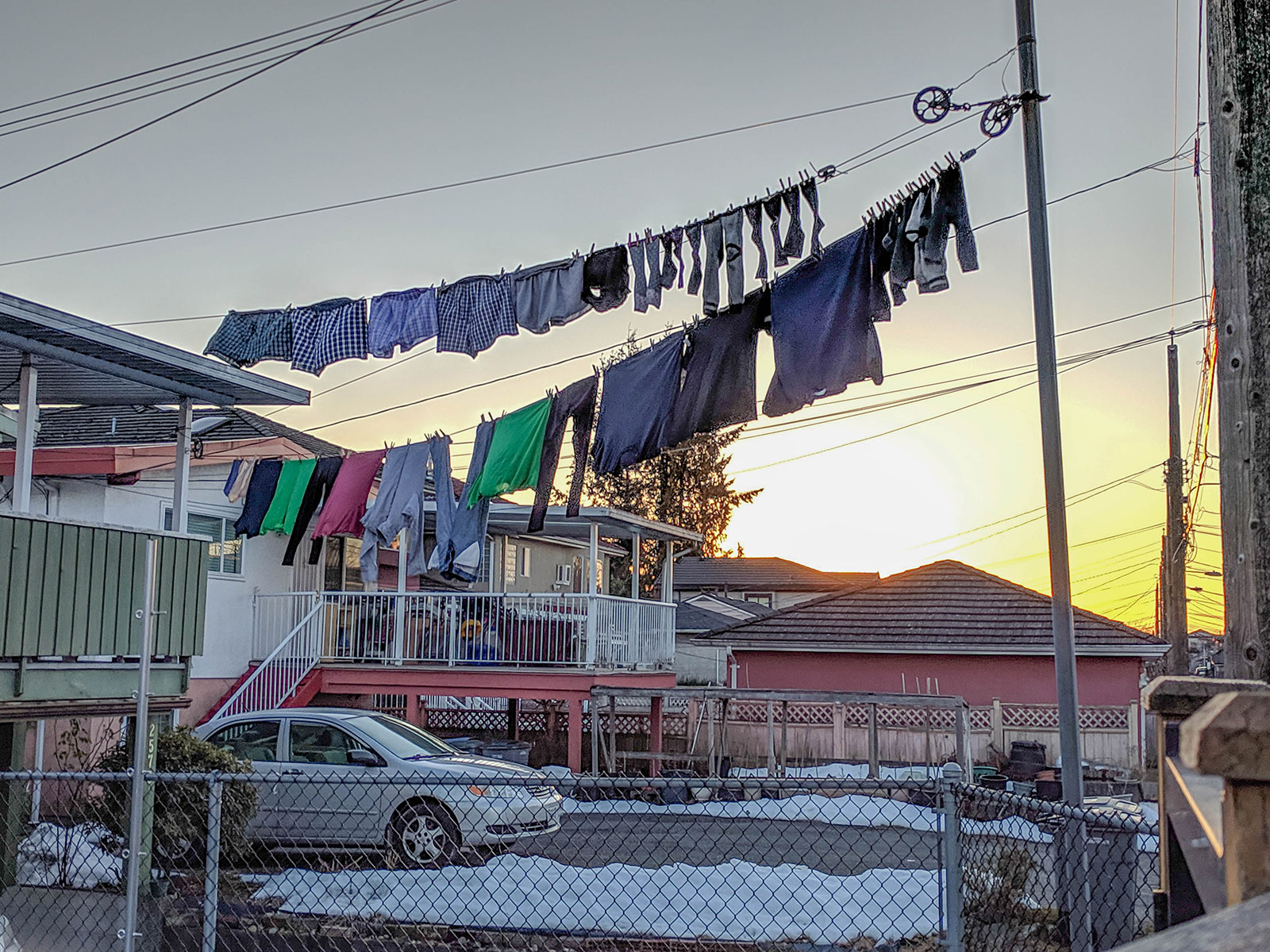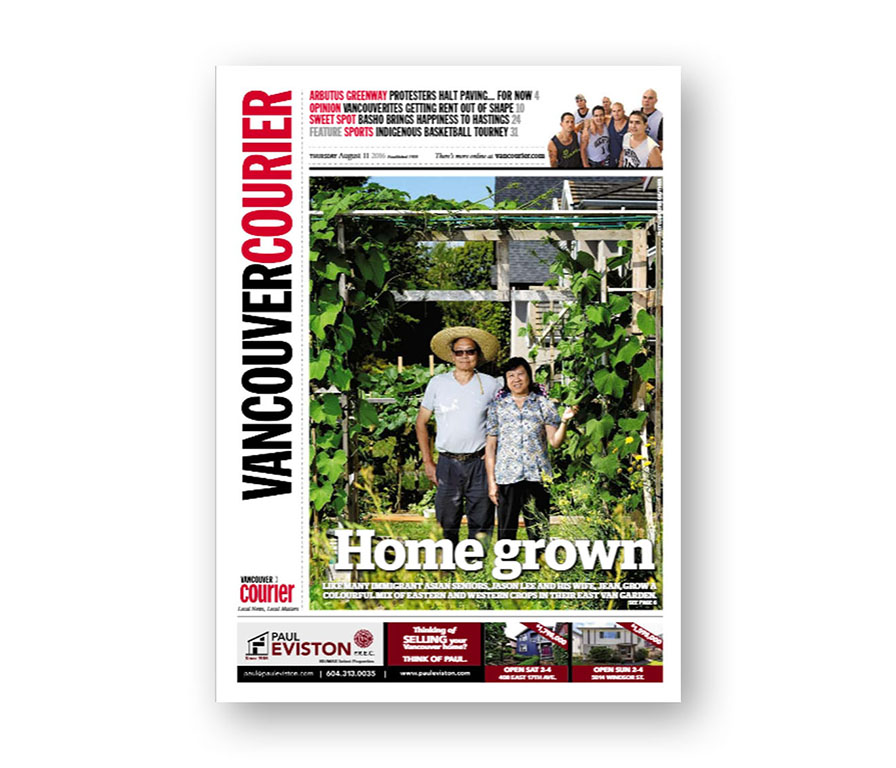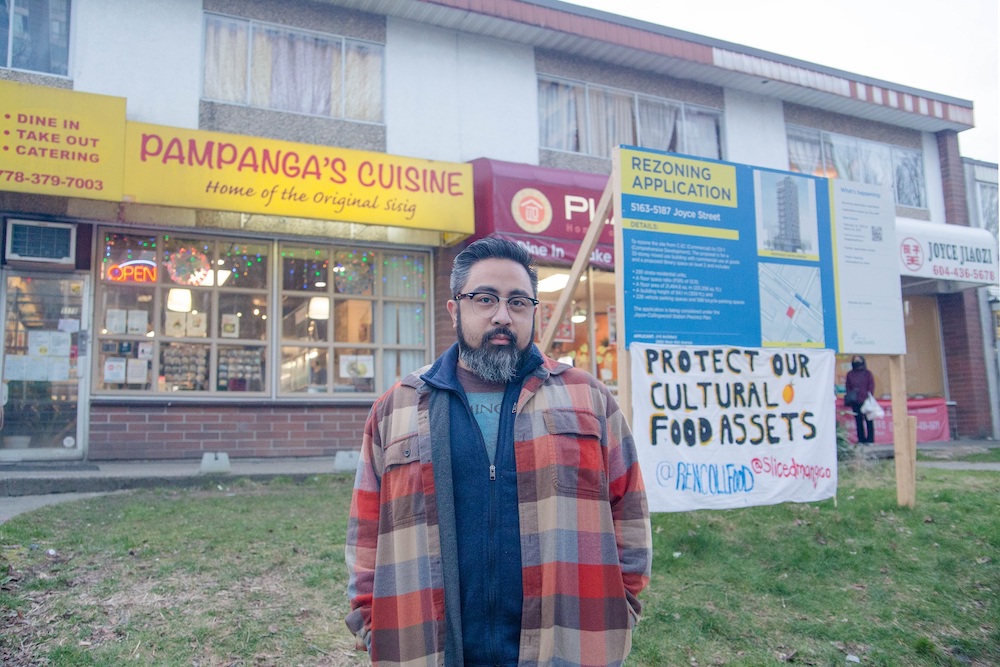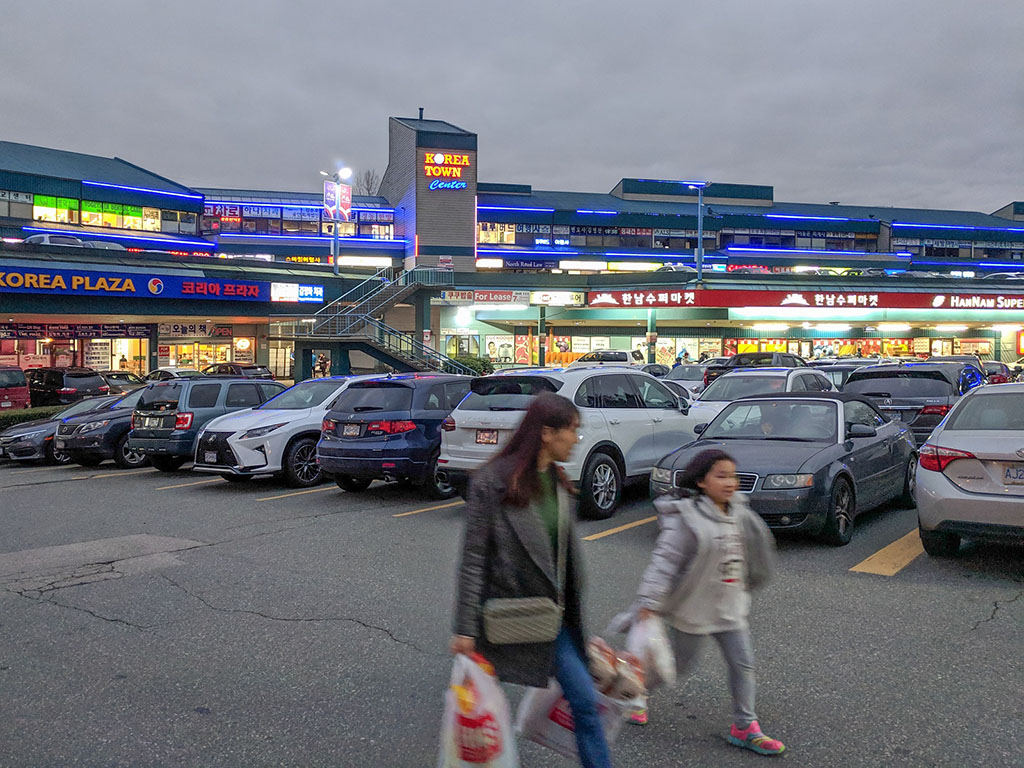[Editor’s note: Tyee reporter Christopher Cheung is this year’s winner of the Dalton Camp Award for the best essay on the link between media and democracy, presented by Friends of Canadian Broadcasting. The essay, titled “Blind Spots,” was originally published in the Toronto Star on June 6. On Friday, Cheung also received the emerging excellence prize from Canada’s Digital Publishing Awards.]
I can’t find the city I know in the newspapers. Anyone who doesn’t speak English or is too busy working isn’t invited to speak on the radio. Their lives are rarely on the evening news, because TV crews drive past their neighbourhoods unless there’s a crime to be covered. As for the newer outlets that have staked out a place online — the ones that maimed the free weeklies and captured the ad money that kept them alive — they’re more concerned with “The 14 Hottest Patios to Hit Up this Summer!” than they are with keeping citizens informed and engaged.
I came to this realization thanks to my grandfather’s vegetable garden. All my life I’ve eaten the chayotes, green beans and winter melons he tends to every morning. He’s lived off his garden since before I was born.
My grandfather isn’t the only one in the neighbourhood who grows vegetables. Many are Cantonese like us. Mr. Chow with his wax gourds. Mrs. Chang with her bitter melons. Others are immigrants from different parts of the world who landed here and started growing things on Vancouver soil, like Mr. Stubos from Greece, who lives across the street from my grandfather with his giant tomatoes and sour cherries. Over the years, this band of neighbours has chatted over garden fences and shared seeds and harvests with each other.
When I lived in other parts of the city, the story was the same, though with different characters. Mrs. Fung with her Szeyap bitter greens. Auntie Mee Mee with her goji berries. The shy Portuguese couple with the beautiful, enviable figs. On evening walks in the summer, I wouldn’t see a single street or alley without these lush gardens and some retiree tending to them, often with a grandchild helping.

Imagine my surprise, then, when I opened up the Sun, our daily paper, and read about how Vancouver is catching up with other North American cities experiencing an urban farming “renaissance.”
Renaissance? These yards have been feeding Vancouverites since before I was born. Curious about what this renaissance might entail, I read on.
The story, one of many on this subject, celebrated gardens that were the result of city-sanctioned efforts, with tech firms and young urbanites looking to consummate a green lifestyle. It was farming by the Brooklyn playbook that has gone viral from city to city — not a made-in-Vancouver approach. One such urban farmer interviewed by Montecristo magazine said that most homeowners’ lawns are about decoration for “leisure value or visual appeal.” He boasted about his “resistance,” “challenging” the idea of what a yard could be if it were farmed. He and others went on to talk about “reconnecting” people with food systems and their neighbours in this grand effort.
Obviously, these new Vancouver farmers hadn’t checked their own city to see if what they were doing was new. Google Street View could have told them. If this was, as they called it, a “resistance,” then my grandfather and thousands of urban farmers like him were original overthrowers of the status quo, one melon at a time.
I once thought journalism was a reliable reflection of reality. Nowadays, I can’t help but view reporting as a reflection of whoever happens to be holding the pen, and they aren’t representing or writing about large parts of the community. Journalists may aspire to gather and report the truth, but what good is that if they don’t interrogate their own blind spots?
I am troubled by the stories that are told in Vancouver, where I live. In many of our neighbourhoods, “visible minorities” are actually the majority. In my former area of Victoria-Fraserview, we “minorities” represented 84 per cent of the population. Yet the diversity that has defined our port city since colonization isn’t reflected in the media. I see many local journalists either ignore cultural diversity or exoticize people and places with an outsider’s gaze, a gaze that often dehumanizes poorer folks as well.
Data on the diversity of Canadian journalists is lacking, though one study by a Ryerson professor in 2006 found that only 3.4 per cent of working journalists were Indigenous or people of colour. If it’s the usual suspects doing the newsgathering, it’s no surprise they return with the usual stories.
Media is supposed to be a pillar of democracy. But what good is reporting if it paints an incomplete picture of our society, always showing the same groups of people with the same perspectives in its pages?
I can understand how certain populations are left out of the news. Maybe they don’t speak English. Maybe they’re busy working or caring for their families. Maybe they’re unfamiliar with local media. Maybe they live in areas that journalists know nothing about. Hey, maybe they were in the shower when a reporter called.
But that’s exactly why journalists need to work harder to pursue stories that are truly representative — to speak other languages, to work around other people’s commitments, to fully inform sources about how interviews will be used, to get to know places the way locals do.
How else would people feel that they have a share in local institutions? How else would they feel that society is better when they speak up?

I remember one of the first questions we discussed in journalism school. It was an existential one: what is news? One definition was that news is information that is new. But I had a followup: new to whom?
The National Post once carried a story about congee that began like this: “Want a delicious new way to eat rice? As in, a way that doesn’t involve eating it from a little white takeout box?” The writer seemed unaware that congee is 3,000 years old, or that rice exists outside Panda Express. English language media often has this western gaze, scouting out ancient cultures to discover. My friend joked that I should write an article about toast, the delicious new way to eat bread.
The CBC once ran a profile of a cocaine user living in Vancouver’s impoverished Downtown Eastside. The writer tried to surprise us with the news that the subject was a grandparent who even had “doilies on the coffee table.” It was news for a person so privileged that they couldn’t imagine someone who uses drugs as a human being with a family.
The “new to whom?” question took a disturbing turn in the coverage of entrepreneurs opening restaurants and boutiques to create a “new” neighbourhood called Fraserhood. The local alt-weekly Georgia Straight floated the idea that it could have been called “Little Portland” for its hipness, quoting a business owner who said the area is finally becoming “more of a community.” And Vancouver Magazine reported that before adventurous creatives made it a worthwhile destination, it was a “no-man’s land.”
There was no mention that the area has been a vibrant community since the Second World War, with waves of immigrants from Germany, Austria, Poland, Vietnam and the Philippines making a home there. Or that the neighbourhood has an existing name, Mountainview. I interviewed a man named Andre Matuszewski who immigrated in 1979, and he recalled visiting the neighbourhood’s Polish deli for a comforting sandwich before popping next door for a bowl of phở.
There was a colonial attitude of terra nullius to the coverage, assuming that blue-collar immigrant neighbourhoods did not exist and ignoring the significance of these places to Indigenous people before settlers paved them over.
It would be unfair to say that journalism in Vancouver is all like this — devoid of the poor, the working class or people of colour. But when there is coverage, it often plays to a number of tropes.
One boilerplate is the one about the model minority. You know, the quirky immigrant who doesn’t speak much English but loves Canada and works hard to serve his community and provide for his family. There is a profile in the Vancouver Courier of an elderly Cantonese couple who retired but then “wanted to work,” and now serve “cheap food” to locals at an “unpolished” diner. The quotes make them seem overly sacrificial, “doing my good job,” the husband says, to “get a life no trouble” and send his children to university. There are many of these heartwarming stories in community papers, showcasing poster patriots who believe in the Canadian dream. But these immigrants seem cartoonish, without complex humanity, and the stories promote a simplistic idea that hard work is all it takes for a newcomer to succeed — no government assistance needed — and those who don’t succeed simply need to pull themselves up by their bootstraps.
Another trope is the exotic destination. That’s the one where the author points excitedly to a place that’s off the beaten path, without regard for those who frequent it. Daily Hive once published an article on Jack’s Place, a sandwich counter inside a century-old downtown department store. “Now when we say bargain, we mean it... they are basically free,” the author wrote, adding that it was “grungy.” It was written for tourists on the hunt for cheap eats, but the no-frills counter is actually a treasured spot in a neighbourhood for homeless people and low-income renters. Without full kitchens, or a kitchen at all, they come to enjoy a hot meal on a budget. There is a long history of journalism romanticizing places like this for the grit and adventure while ignoring the people they’re actually for, or turning them into colourful wallpaper.
There are also tropes portraying the poor and people of colour as victims and villains. I encounter reductionist coverage about ethnic Chinese like me on the regular. Chinese people spat on. Chinese people beaten up. Chinese investors with poor architectural taste. Chinese businesses unwilling to add English to their signs. The stories are shallow, with behaviour implied to be a characteristic of Chinese identity, and often lack interviews with the very Chinese people that are being written about. When global-minded publications like the Guardian, Mother Jones and the New Yorker came to town to write features about Chinese nationals buying Vancouver real estate, not a single one of them interviewed a Chinese buyer.
I became a journalist to counter simplistic narratives like these. I wanted to listen to underrepresented people and showcase what they had to say on their own terms. I wanted to use writing as a way for people in my city to have a voice, and for my neighbours to understand who they share this place with.
I pitched a story that had been on my mind for a long time to the Vancouver Courier. You can probably guess what it was about: profiles of immigrant urban farmers like my grandfather, to set the record straight.

They were easy to find and chat with, but hard to convince to talk on the record. I just wanted them to spill the beans on their beans, but the answers I received echoed the same theme.
“This is nothing special. Everyone does this.”
“I’m not an expert! You should ask an expert.”
“Why do you find this interesting?”
I would hear these answers again and again when I interviewed immigrants and low-income people for other stories. One was about immigrant families living with three generations under one roof. It was such a normal thing for them that they wondered why I thought it was worth a story.
As I chatted with them, it became evident that they had a lot to share, but they didn’t think people would care to read about their lives. “You should interview a professor instead,” one told me. Others would agree to an interview, but decline to share their name. “Why do you need my name?” they’d say. “I’m a nobody.”
I began to worry that underrepresented subjects had internalized the belief that mainstream media in their city was not for or about them.
I recently wrote about Vancouver’s only “Filipino Town,” which is about to lose half of its businesses to a new condo tower, spurred by a city plan for increased density. Gone will be the corner store where workers, often with multiple jobs, wired earnings to their families in the Philippines. Gone will be the cheap canteens where pandemic frontliners without time to cook picked up food for the week. When I walked through the area with a Filipino-Canadian advocate who raised a family there, he shared an all too common attitude locals have about the impending destruction of this village square: “That’s just how it is.”

A young organizer told me about a similar response she heard from older Vietnamese Vancouverites when she asked them about government policy. “If something happens, I’ll just have to accept it,” said one elder after another. When COVID-19 hit, seeing the lack of translated messaging for them infuriated her. Was being left behind something to be endured when their livelihoods were concerned? “They shouldn’t have to accept that,” she told me.
I see a self-fulfilling prophecy at work here. If journalists don’t make an effort to seek out underrepresented communities, they won’t know that their experiences are worth sharing, or that what they say has the power to shape society.
Our democracy needs this plurality. Difference should not be measured from a baseline of privilege. The stories I most often read about my city are Vancouver as yogadom, bike mecca, cannabis central, Left Coast and Hollywood North. Homeless or racialized people can’t be sprinkled into the coverage as supporting characters or exceptions to the norm. This is their city too, and they deserve to be in the spotlight — their trials, their triumphs, their day-to-day routines. Where do they stop for a bite? How do they make ends meet? What are their dreams?
If journalists don’t get to know the people they serve, why would they ever want to share anything?
There is a joke in journalism school that the millennials and Gen Zs entering the profession are too afraid to pick up the phone. Pity democracy if they never even leave the office. ![]()
Read more: Rights + Justice, Media
















Tyee Commenting Guidelines
Comments that violate guidelines risk being deleted, and violations may result in a temporary or permanent user ban. Maintain the spirit of good conversation to stay in the discussion.
*Please note The Tyee is not a forum for spreading misinformation about COVID-19, denying its existence or minimizing its risk to public health.
Do:
Do not: